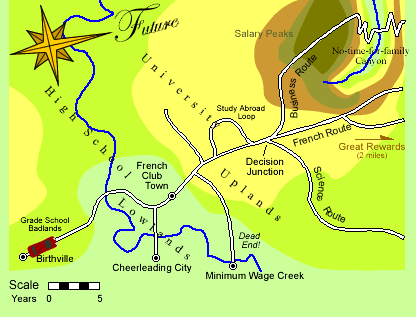
Another way to look at the difference between the imparfait and the passé composé is in terms of perspective, the position a narrator takes when relating a story.
When an action is related using the passé composé, the narrator is taking a position that is distant from the action, so that it can be viewed overall, in its entirety, complete with starting and ending points. The narrator knows that an action is complete. The narrator is omniscient.
| Je suis allée au travail. The narrator is telling us, with authority, that the journey was completed. The narrator arrived at work that day. |
When an action is related using the imparfait, the narrator is taking a position that is close to the action, so that it can be viewed from the eyes of the protagonist. The narrator can only see what's immediately in front at any given moment. The action in the imparfait, like the narrator, focuses only on the present moment (in the past), the situation at hand, and doesn't pay attention to when a situation began or when it will end. The imparfait is sometimes called the 'present-in-the-past' for this reason.
| J'allais au travail. The narrator is putting us in the protagonist's position. We don't know if she will get to work that day. |
If you think of your life as a journey, then a passé composé view of that journey will be like a map. You can see the progress that's been made. You can see the achievements that have been completed. You can see where paths began and where everything ended.

An imparfait view of that same journey of your life will be just as you saw it when you were living it: you will be on the road itself, looking forward, not knowing exactly how you got where you are, and not knowing where each fork in the path will take you.
